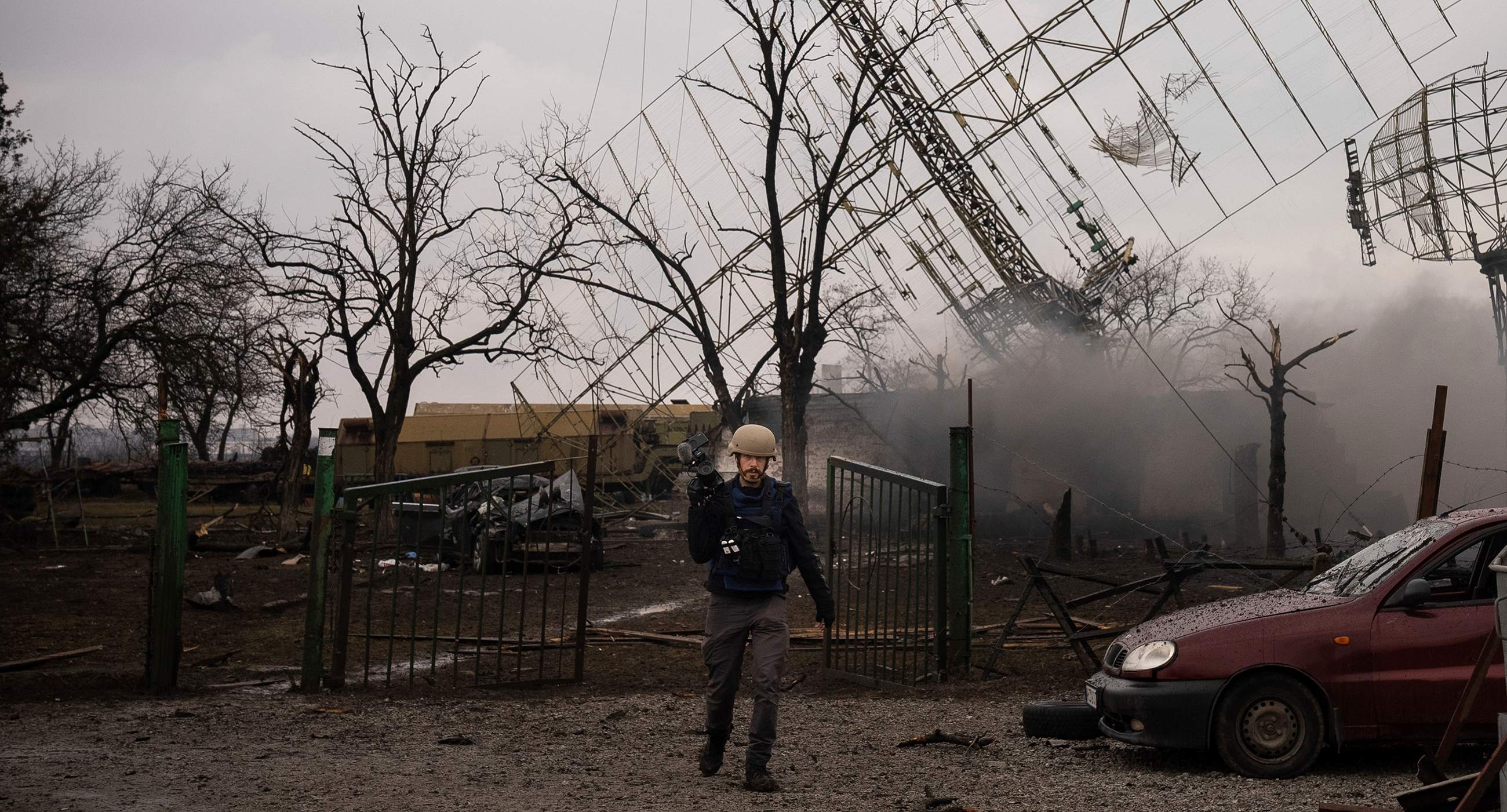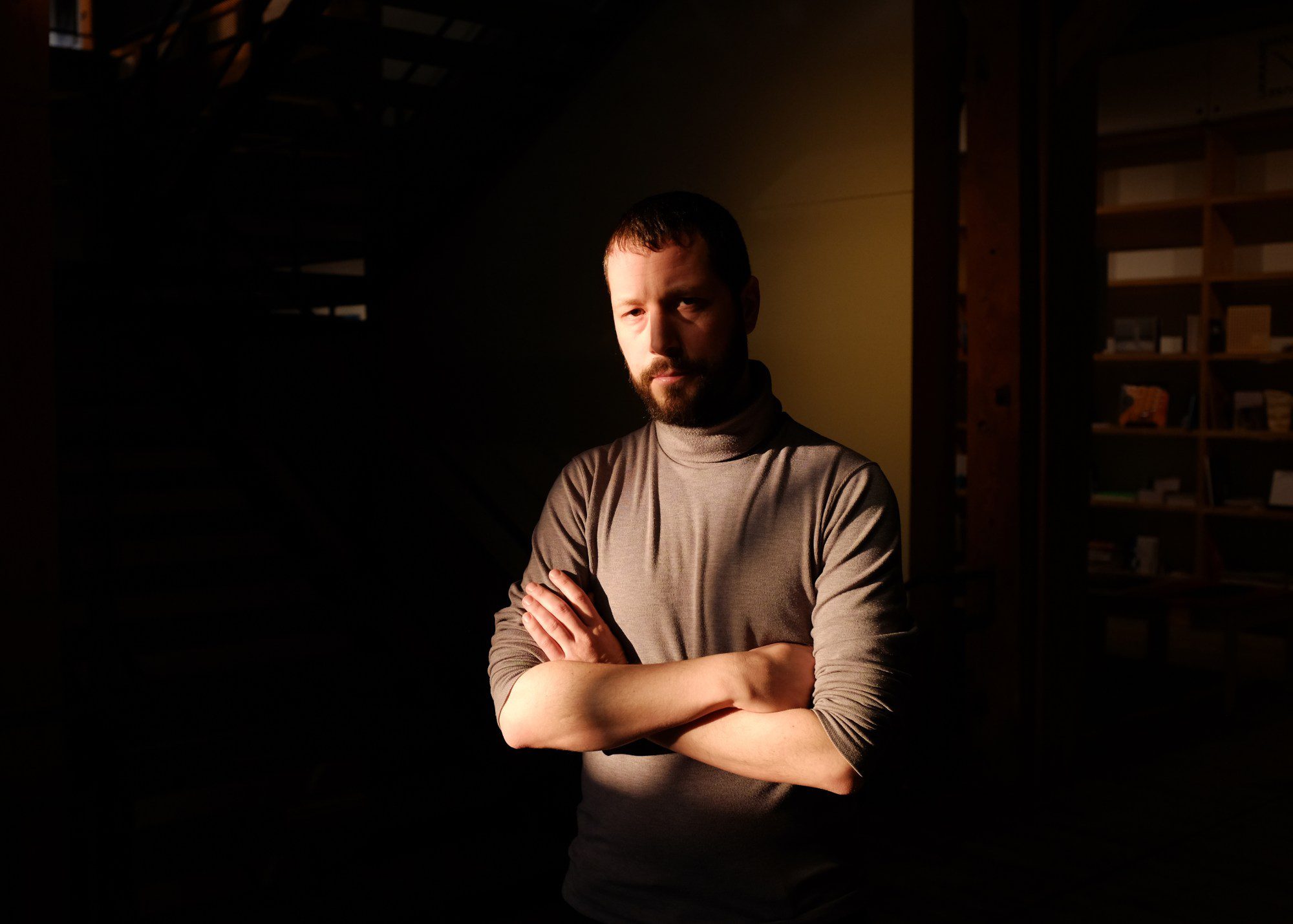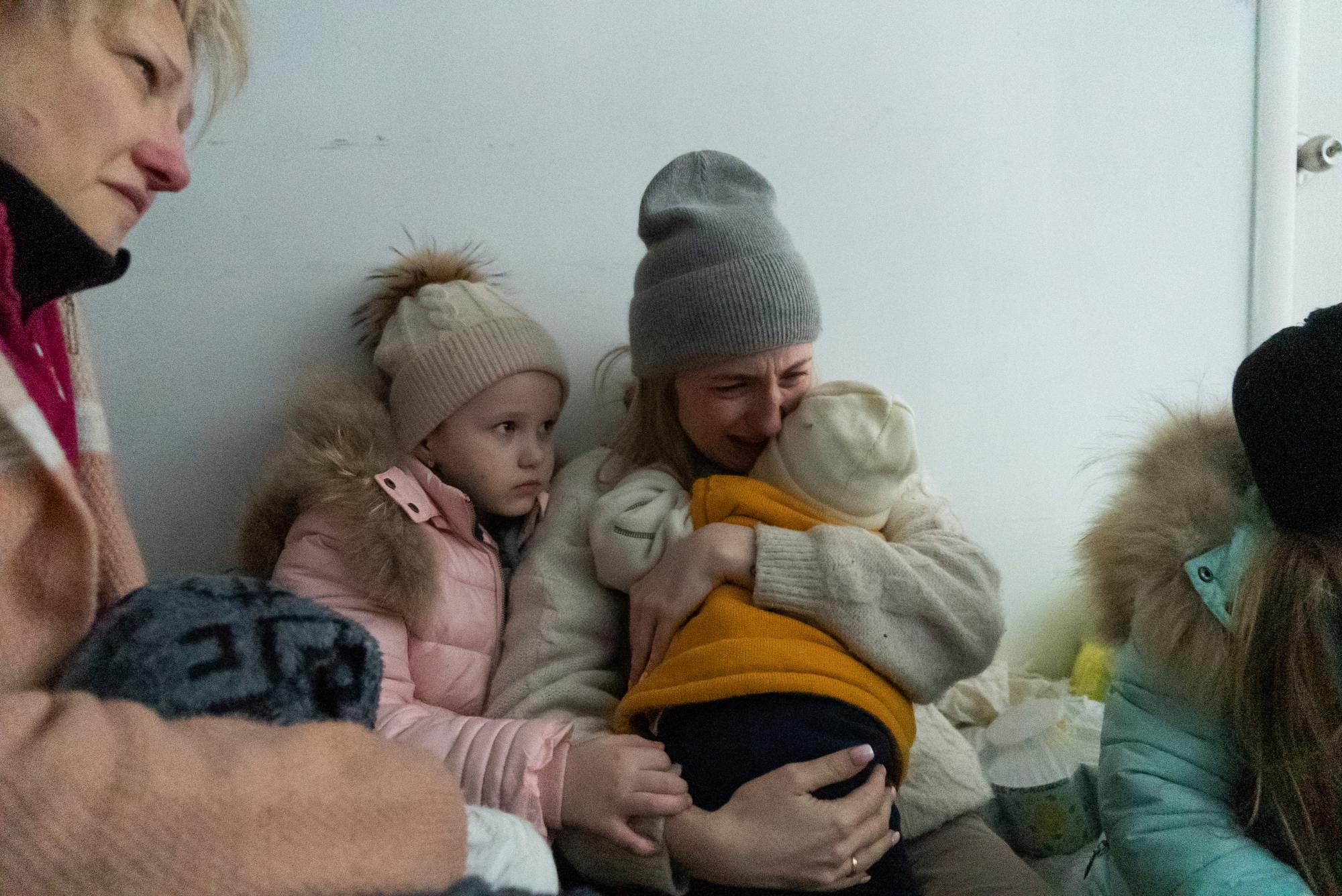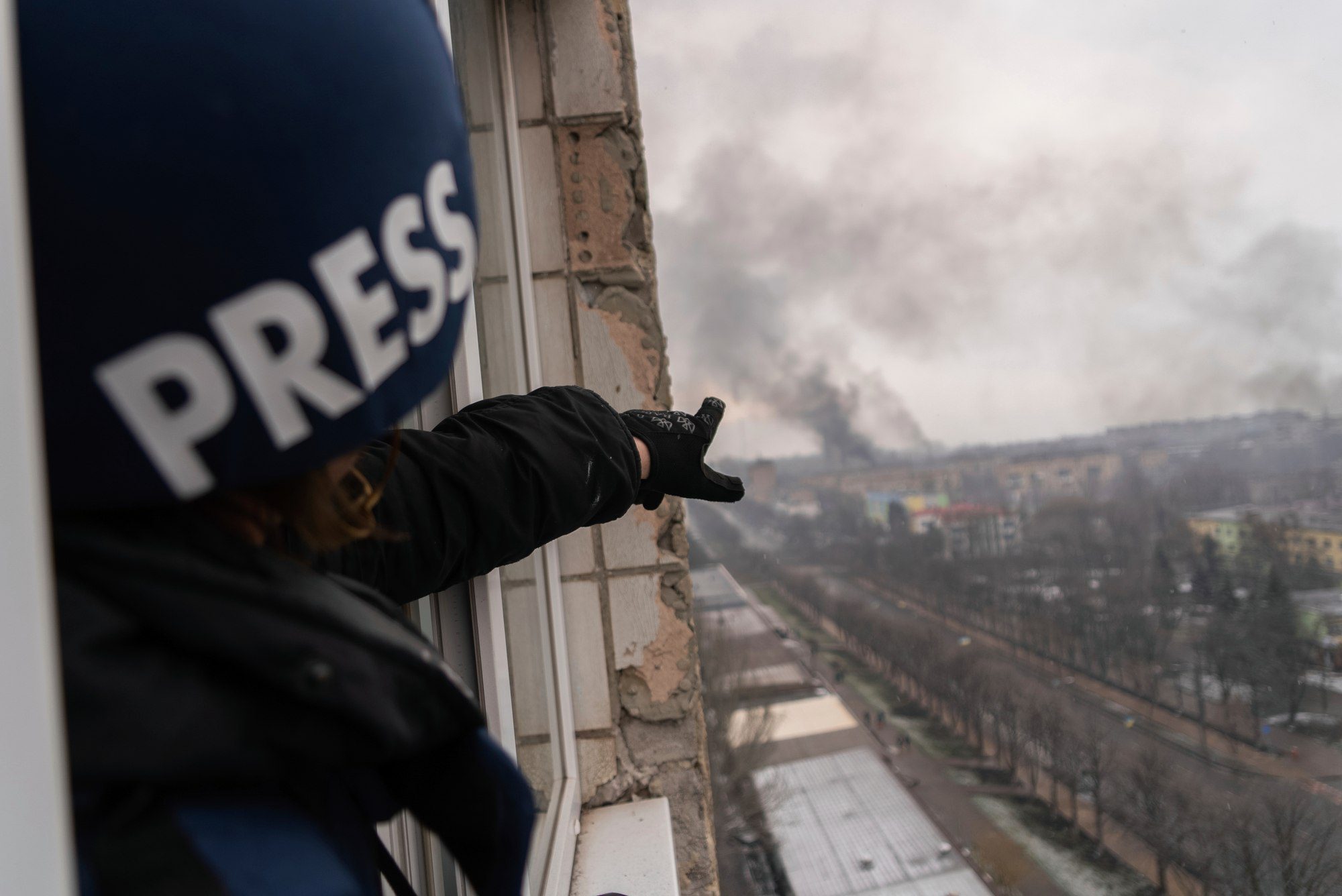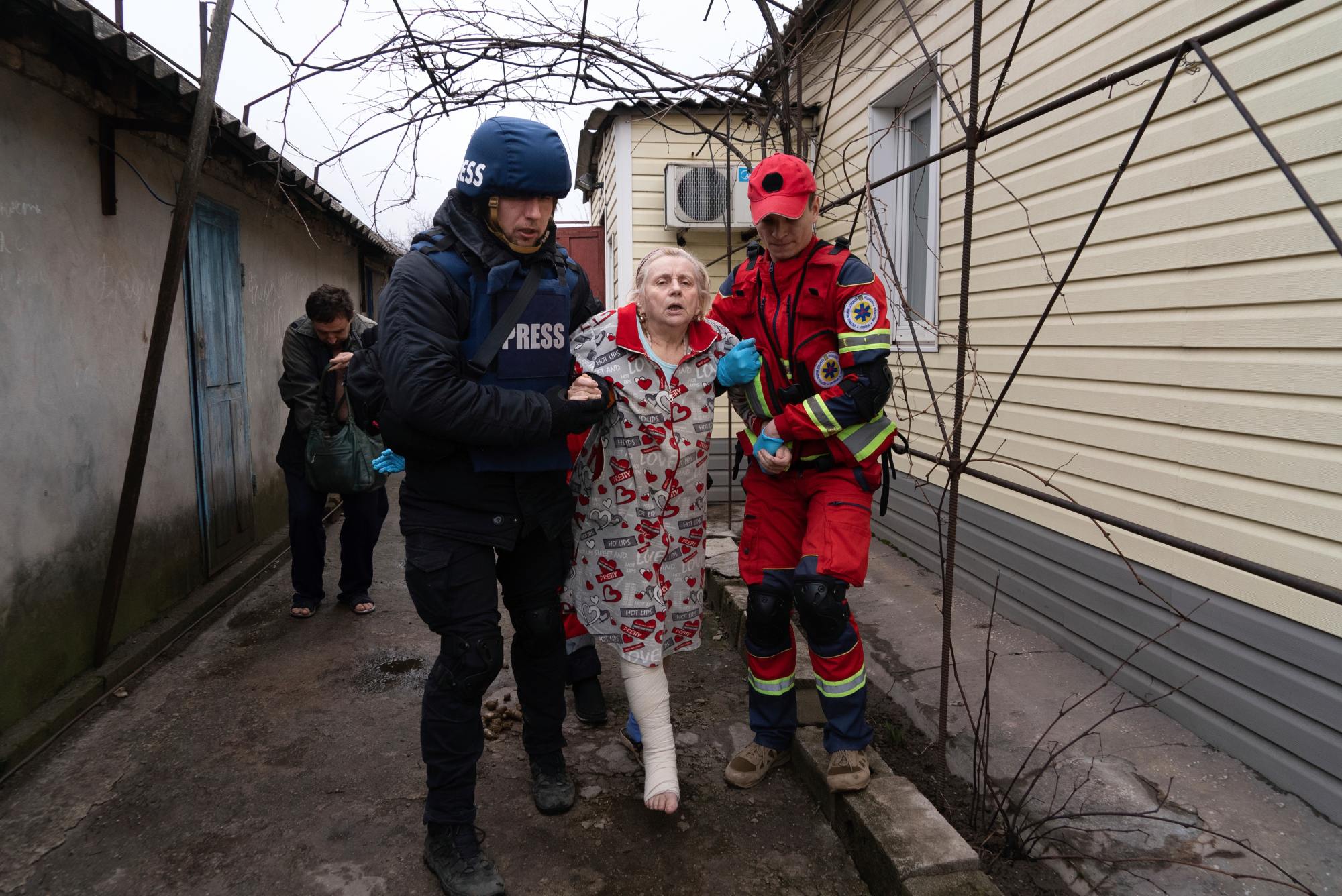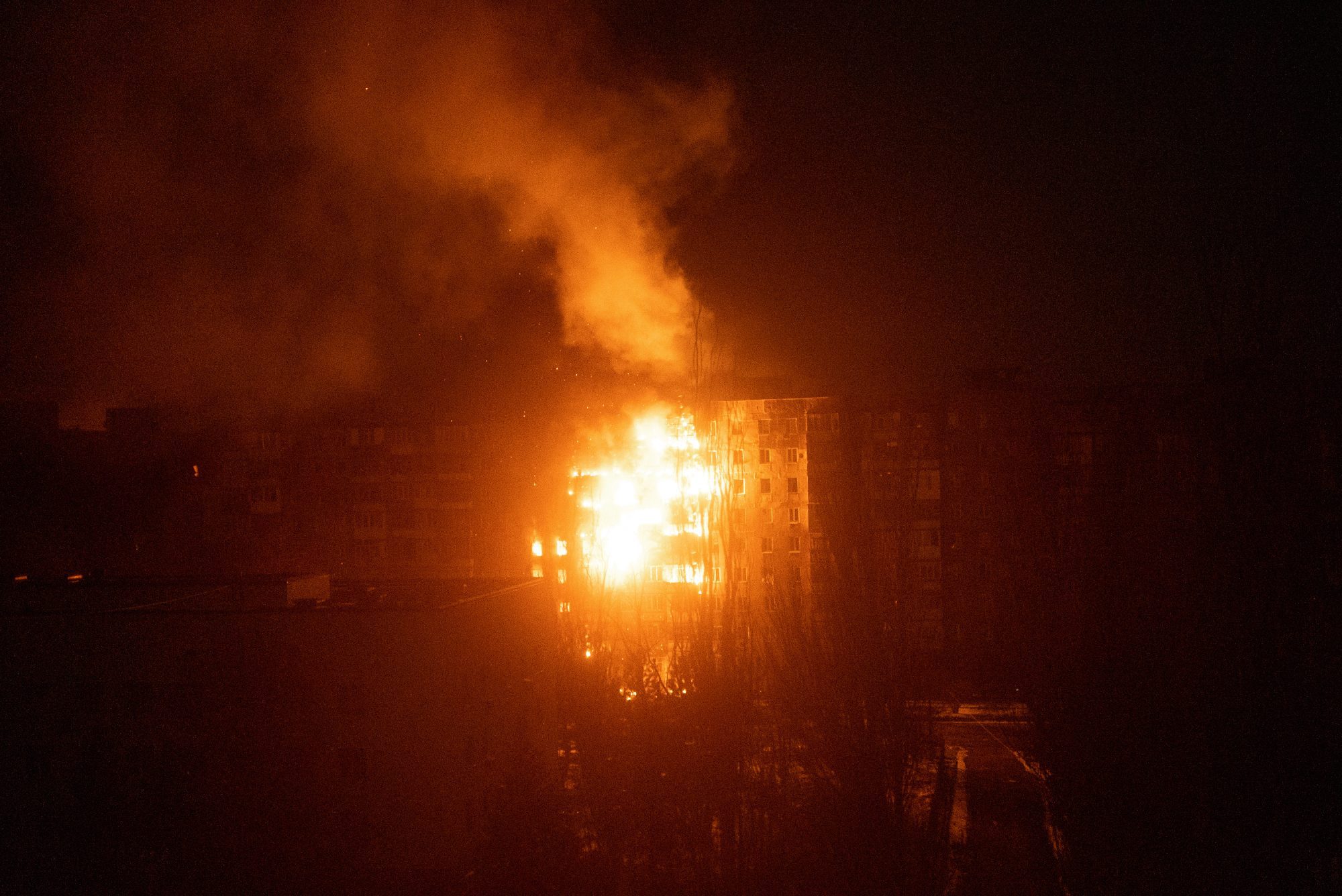The documentary “20 Days in Mariupol” by Mstislav Chernov won the prize of audience sympathy at the largest American documentary film festival, Sundance, in early 2023. The tape tells about the first days of the Russian invasion of Mariupol, where Chernov found himself with a film crew of the international news agency Associated Press. Zaborona editor-in-chief Kateryna Sergatskova met with the videographer during the CPH:DOX festival in Copenhagen, where the European premiere of the film took place, and talked with him about the objectivity of covering the war in their native country and what Ukrainians can do to make it better heard on the international stage.
Mstislav Chernov is a permanent video correspondent for the Associated Press in Ukraine who works in war zones. He founded the Ukrainian Association of Professional Photographers and is a member of the Advisory Board of the 2402 Fund for Urgent Support of Journalists.
At the beginning of the Russian invasion, on February 24, he found himself in occupied Mariupol with photographer Yevhen Maloletka and producer Vasilisa Stepanenko. There he filmed Russia bombing a maternity hospital and private homes, looting, Russian tanks entering the city center, and communication problems. He sent all the videos daily via satellite to the agency so the world could see what was happening in the most difficult war zone.
The AP team was in the besieged Mariupol for 20 days. After Russian troops began to enter the center and the danger reached an extreme level, the journalists decided to evacuate. Mstislav Chernov later compiled a film from his news footage. The AP team received dozens of world awards for their dedication to journalism and work in dangerous conditions, including the most prestigious World Press Photo award.
At the beginning of the film “20 Days in Mariupol,” you meet a woman – it seems something has flown into her house. You tell her: “Sit at home, don’t move anywhere — they don’t shoot at civilians.” And she clarifies: “Really? Exactly?”. She believes that you, as a journalist, know more, but, in fact, without information from the outside, you say what you know now. Can you tell me why you gave such advice?
She said she was expecting her son. Wait for her son on the street, where, as I understood, there will be shelling. What else did I have to say? Go down to the basement, wait — that’s it.
Why was it necessary to calm her down?
What to do if a person is panicking or has a hard time and needs help? I don’t know if a foreign journalist would do the same, but I think so: understanding the context of what is happening, I think they would advise the same. At that moment, I did not fully understand the dynamics of the invasion. Yes, we were aware that the invasion had begun, and it had begun everywhere. However, we hoped that the scale was not such. Everyone, it seems, initially thought that Russia would continue its offensive in Donbas. But it turned out not.
Didn’t you know then that they were shooting at Kyiv?
I did not understand how quickly the situation would deteriorate or how extensive the destruction would be. No matter how bad the situation [is], it makes sense to hide in the basement — at least for the first day until people have more information and until the dynamics become clear. That’s a normal thing to say to a person, I think. I really wanted to calm her down, and I tried to calm everyone I met in Mariupol: everyone was traumatized and scared.
Did you not regret it later when you realized that civilians were being shot at and the best way out for people was to evacuate?
When we spoke with this woman, the press conference of the mayor of Mariupol [Vadim Boychenko] was taking place: he said that evacuation was not necessary and, at the moment, everything was fine. We watched this official signal and how the journalists broadcast it to the people they met. Whether it was right or not is not for me to decide. Of course, if people had evacuated on the first day or even earlier, I think there would have been fewer victims.
But it seems there were so many victims because no one expected such a quick encirclement of Mariupol. The Russians broke through near Volnovakha and cut off the main road — and within a few days, the evacuation was impossible. No one expected this. That line of defense in the Volnovakha area was built eight years ago. [Ukraine] expected that they [the Russians] would break through from Crimea, but not from this side. They broke through very quickly, surrounded quickly — this is the first reason.
Second, Mariupol lived on the front line for eight years, and people were already used to war. This habit of war kills many: war becomes normality, and you are no longer so afraid and react to danger, to bombs falling near you.

Mstislav Chernov. Photo: Roman Stepanovych / Zaborona
We journalists often talk about when to put down the camera and go save people. Did this invasion somehow change those borders for you?
No, for me, this invasion started in 2014, like for everyone. Even then, I finally decided what to do in each such situation. Thinking every time whether to shoot or help someone is just a waste of precious time. Therefore, in 2014, I decided once and for all: if a person needs help and no one can provide it, you need to throw down the camera and do it yourself. If there is a competent person around who can help, I will continue to shoot — and I will shoot everything, and only then will I decide what to publish.
I remember that already sometime during the refugee crisis in Europe in 2016, I helped jump [migrants] out of these rubber boats onto the shore of the [Greek] island of Lesbos. It was a terrible picture: thousands of refugees who were helped by everyone, including journalists.
In Iraq, I filmed refugees climbing into a truck that was taking them away from the battlefield. The footage shows me grabbing people and helping them climb in. I discussed with the editors, is it possible to put it in the plot? Because you can see how a journalist helps people. We published it. I think this is normal and right.
There are many such moments in the film “20 Days in Mariupol”. They were not published in the news because there was simply a lack of time and opportunity to insert them into the short little stories that I could send from Mariupol — because of the lack of communication, I tried to be very economical. But during editing, these shots turned out to be real finds. I didn’t even remember these episodes or the conversations with the woman I was trying to calm down.
You must have been trying to calm yourself down?
Yes, I didn’t remember many of my reactions. How I just sit on the floor after [baby] Evangelina dies. Talking to the military outside the hospital, when they tell me, “Don’t film,” I say, “How can I not film this when it’s a historic [moment]?” I lower the camera down and just talk to them. Only during editing did I find these moments and put them in the film.
At the beginning of the invasion, I often heard from my colleagues: we no longer see ourselves as journalists and the meaning of this profession. I did not have such thoughts, but many people felt it. Many journalists joined the ranks of the Armed Forces of Ukraine. Have you had these hesitations?
I believe that everyone should do what they do best. It does not depend on whether you have a machine gun, a grenade launcher, or a camera in your hands. Journalists are not fighters. But the fact that we are telling the truth, that truth and justice are on the side of Ukraine in this war, automatically makes our task even more important. We are trying to shed light on the injustice of this invasion and the murders and crimes committed by Russia and its troops.
Sometimes I feel that journalism does not influence world opinion so much and cannot stop the war. We would all like to believe in the power of journalism and reliable information: they say that if everyone learns the truth, the war will automatically stop. However, this is not possible, unfortunately. But at least we still have the function of historically documenting events. If someone in five or ten years — Ukrainians, Russians (I hope so), Europeans, or Americans wants to know what really happened to Mariupol, this film will be the proof. Everything that Ukrainian journalists did during the year — all nine years — will become a historical document. And the importance of this cannot be underestimated.
Foreign journalists often ask me: “Why is there so much violence, death, and blood in the film? Why couldn’t something be covered, smeared, or simply not installed? It is shocking.” And I answer them: “And what would happen now if, during the Holocaust, something was covered up or some footage was hidden?”. Even now, when we have videos of thousands of murdered Jews and civilians all over Europe, in Ukraine, some people deny the Holocaust (why this is happening, Zaborona wrote here). Perhaps, in a hundred years, the same will be said about this invasion. I do not want this. I want to leave a record of Russian crimes in history.

A woman whose husband was killed in shelling cries on the floor in a hospital corridor in Mariupol on March 11, 2022. Photo: Mstislav Chernov / AP
You were in Mariupol for 20 days, and a year has already passed since you left there. Since then, we generally do not know what is happening in the city: photos and videos from propaganda or agency channels do not give a complete picture. Why can’t you shoot more in Mariupol, in the occupied territories?
Because we are information terrorists for the Russian Federation, they officially said this on March 9 [this is about propaganda messages from Russia, where the AR team is accused of taking “staging” footage from the maternity hospital]. And I wouldn’t want to be among the people who call me an information terrorist. I really want to return to Mariupol to film everything that is actually happening there. But, probably, I will be able to do it only when the city is liberated.
Yes, I often think about it: the absence of an independent press in the temporarily occupied territories and Russia is understandable. But the fact that we do not have any reliable information from there creates a particular imbalance. Why are independent foreign journalists unable or unwilling to go there?
The lack of reports from there is an information vacuum. It will be filled with propaganda if it is not filled with true information. That is why telling the truth about what is happening there is so important.
Almost all the stories we see from Mariupol say that it was reconstructed, that everything is fine there, the sun is shining, people are relaxing by the sea, etc. However, we have access to satellite images and phones of people who live there under occupation. So we know for sure that we rebuilt 5-10 houses and demolished 200.
So we can get reliable information only from space?
So far. Whether to go there or not is for each foreign journalist to make for himself. I understand that there is more than one reason why people do not go there. First, this is an occupied territory, so there should be specific guidelines or rules from official Ukrainian sources: can you film there or not? Maybe, if there were clear instructions, more people would go there.
Do you think something depends on the Ukrainian side in this regard? Crossing the demarcation line?
Not an omission, but for international journalists to understand precisely how the Ukrainian authorities will react to such shootings.
So that they don’t get banned later?
I don’t know, the goals of such trips can be different, as well as the reactions to them. If, one day, clear rules are established on whether independent international journalists can do anything at all in the occupied territories, it will help them to tell more. But we all understand that there is no such thing as independent journalism for Russia — it needs to promote (especially in the occupied territories), its narrative. Those who do not promote it are simply not allowed there — and this is another problem.

Photographer Yevhen Maloletka points to smoke rising after an airstrike on a maternity hospital in Mariupol on March 9, 2022. Photo: Mstislav Chernov / AP
I often hear from foreigners, especially in Europe, that Ukrainian journalists cannot objectively convey information because they are involved as citizens of Ukraine and can also work for state propaganda. Have colleagues at the agency or other media ever told you you are biased?
I really often hear this question from foreign colleagues. And not only from them but also from people who talk to me after the film’s screening or just ask some questions at conferences. My answer is always the same: it is possible to remain objective and fair while being a country citizen and working in it simultaneously because it’s one thing to feel emotions, strong emotions, and another to be biased.
Secondly, none of the viewers of “20 Days in Mariupol” told me: “Mstislav, you know, you are biased.” All you have to do to be disengaged is show it. You don’t even need to comment. It’s enough for people just to see what’s going on so that they have enough context because context is essential: it helps people understand.
We live in an age of information warfare, which began in one form and has now moved into another. It occurs between countries where the fight is not about showing something or not showing it but about how these photos and videos are interpreted. There is an ongoing war of interpretation.
A war of captions [for photos or videos that accompany frames in publications]?
The war of the captions, yes. It may be counterintuitive, but the Russian news showed as much footage of the bombing of the maternity hospital in Mariupol as the Ukrainian or American news. But the [accompanying] text was quite different. Everything was turned upside down and taken out of context.
When the viewer watches the film and has access to what happened five minutes before and after the moment he saw on the news, if he knows the story of how the journalist ended up in this city, he can already resist manipulations. It is why documentaries are so important. It is one of the reasons why I decided to make the film “20 Days in Mariupol”.
The whole world saw your footage from Mariupol and the photos of [photographer] Zhenya Maloletka, with whom you filmed together, mainly because you work for a huge international agency. Could you imagine the same feedback if you worked for Marathon News, Kharkiv MediaPort, or any national or local media?
It all depends on how important the event you are recording is. We saw a lot of footage that went around the world and was filmed for small news sites — in Syria, Iraq, and Ukraine. If the event is significant, the world will see it anyway.
Yes, it’s more challenging to work when you don’t have resources, transport, or security, when you don’t have editors who help you see a broader perspective, who will say: “It’s essential that you find the women you shot yesterday and make a follow-up [continued] of this story.” It always moves because you are not alone — you have a team. Not only the one that works on the spot but also the people who help to see the context.

Associated Press photographer Yevhen Maloletka helps a paramedic transport a woman injured during shelling in Mariupol on March 2, 2022. Photo: Mstislav Chernov / AP
Do you have advice for journalists who work for local or national media and want their stories to be in a global context?
The advice is simple, but actually very important — to know the English language. If a Ukrainian journalist is fluent in English, his voice will find an audience. Whether it will be an independent YouTube audience or international agencies or channels — but all media, news sites, and agencies now value Ukrainian journalists and the voice of Ukrainians because they know that this war, unfortunately, will continue for a long time. And also that foreigners will finish their tasks in Ukraine and go home, while Ukrainians will stay and show the world their country’s history. Therefore, if a journalist knows English, foreign media will definitely find him. It sounds simple, but now it is the most important thing a Ukrainian journalist can do.
You travel a lot because of film screenings and international awards. You are allowed to leave the country. Recently, we have had problems with this permission, and the situation is becoming more and more difficult due to some actors who break the rules and do not return to Ukraine. What do you think about the rules for leaving, issuing permits, and the changes taking place? Is it fair?
Unfortunately, people ignore the rules and do not return or use cultural events with the participation of Ukraine to leave and not return. I believe that any citizen must stay during the war [in Ukraine] to do everything possible, help the world see what is happening, or simply help people: relatives, or Ukrainians if there is an opportunity.
It is a pity that when some do not return, others suffer because of it — who always return and have to leave to represent Ukrainian culture and Ukrainian media. I hope a balance will be found and fair rules will be established for cultural figures and journalists so that those who really need to represent Ukraine internationally have free access to this opportunity. I hope it will happen. But we are in a state of war, and it is challenging to find quick solutions to such problems now.
Do you have any idea how this should work?
These are technical issues. Maybe some kind of system check is needed — to pass it once and have the opportunity to enter and leave to perform my task for a while. Submitting regular performance reports might help. The system should work. Because keeping Ukraine in the global information field is also a complex and important job that we perform.

A fire occurred in an apartment building after shelling a residential area in Mariupol on March 11, 2022. Photo: Mstislav Chernov / AP
What do you think about the full-scale invasion story that is key right now and perhaps under-reported in terms of information?
My responsibility is to tell the world about what is happening to ordinary Ukrainians: how the war maims, kills, and destroys their lives. It seems to be the main topic for the international community as well. I see how people (Europeans or Americans) react to stories where we tell the stories of the Ukrainian military and the emotional response the same audience has to how civilians suffer. [In the latter case], the resonance is much stronger. And this is precisely what pushes the international community to continue helping Ukraine, particularly with weapons. Therefore, this is the most crucial topic. We must tell as much as possible about ordinary Ukrainians whose lives were changed or destroyed by the war. It is the key to the world continuing to support Ukraine.

